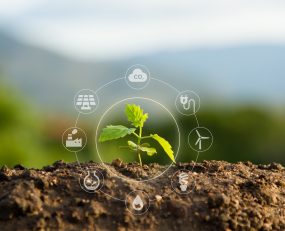
This year’s COP26 in Glasgow was widely reported as the last chance for nations to agree a strategy for keeping global warming within a 1.5OC temperature rise. Reactions to the final agreement, the “Glasgow Climate Pact” have been rather mixed. In an interview with Ti Insight, Alan McKinnon, Professor of Logistics at Kühne Logistics University, an expert in logistics decarbonization and a speaker at COP26, considers how the conference addressed the challenges of getting freight transport onto a net zero pathway.
Prof. McKinnon, what would be your overview of this year’s COP, especially with respect to logistics?
Alan McKinnon: It is very hard to capture the essence of COP26 given its scale and diversity. The COP26 outcome has so far been judged primarily by the wording of the final Climate Pact. This is pitched at a high level and makes no specific reference to transport or logistics. Freight transport is the focus of several other documents to emerge from COP26, both official statements from member countries and reports of international bodies, industry associations, NGOs and others. Important as they are, I would argue that they do not adequately address to carbon-reduction challenges facing freight transport worldwide, an activity that accounts for just under 10% of energy-related CO2 emissions. Much of the discussion of transport at COP26 was confined to the movement of people, despite the fact that freight accounts 40% of total transport emissions. This was not surprising as very few of the Nationally Determined Contribution statements submitted to the UN prior to COP26 explicitly mentioned freight transport. I don’t want to be too negative, however, because several important freight initiatives were launched during the conference.
What exactly do you mean with that?
Alan McKinnon: I can give several examples. Twenty-two countries, including the UK, signed up to the Clydebank Declaration for Green Shipping Corridors that will create at least six zero-emission maritime routes between two or more ports by the middle of this decade. It is not clear how this will be achieved, but at least the commitment has been made. Another example is a global Memorandum of Understanding signed by fifteen countries and another twenty ‘sub-national’ organisations to ban the sale of new diesel-powered trucks by 2035 if they have a gross weight under 26 tonnes and 2040 for heavier vehicles. The MOU doesn’t specify which low-carbon technologies will replace diesel engines but this is likely to be a mix of batteries and hydrogen-fuel cells, supplemented in some countries by highway electrification.
Besides technology, business practice is often mentioned as a critical factor in the decarbonisation of logistics. Was progress made on this topic at COP?
Alan McKinnon: Yes, some progress, but not enough. Over the next nine years, much of the reduction in logistics emissions will have to come from changes to business practice, as they can be implemented more quickly and often at a low or even negative carbon mitigation cost. As the recent survey of European logistics executives by KLU’s Center for Sustainable Logistics and Supply Chains (CSLS) showed, there is wide recognition that freight modal split, digitalisation and supply chain collaboration can make a big contribution to decarbonisation. At all the freight and logistics sessions that I attended at COP26, collaboration was an enduring theme. It is, for example, central to a new managerial initiative launched at COP26 by the Smart Freight Centre to encourage companies to attach greater importance to carbon intensity when procuring freight services, equipment and energy. The new Sustainable Freight Buyers’ Alliance (SFBA), which has already gained the support of companies such as Nestle, P&G, HP, Tata Steel and Maersk, aims to save 100 million tonnes of CO2 by 2030. If achieved, this alone would represent a very welcome low-carbon logistics legacy from COP26.
Source: Transport Intelligence, 25th November 2021
Author: Alan McKinnon